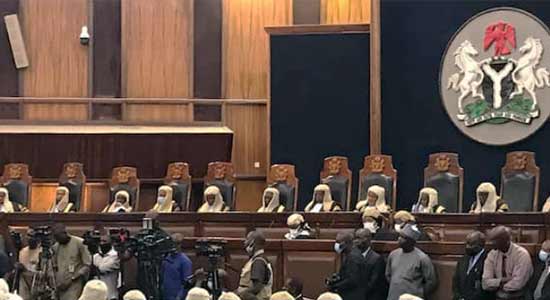
Supreme Court Justice Musa Dattijo Muhammad, with 47 years in the Nigerian judiciary, delivers a compelling valedictory address addressing critical challenges and the need for reform.
In a poignant valedictory address at the Supreme Court of Nigeria, Justice Musa Dattijo Muhammad marked the end of his illustrious 47-year career in the Nigerian judiciary. In his comprehensive speech, Justice Muhammad offered insights into his personal history, concerns about the state of the judiciary, and calls for reform.

Growing up in Minna, Justice Muhammad shared his family background, revealing that his grandfather was a distinguished Sharia judge. His own journey led him to graduate from Ahmadu Bello University in 1976 and join the judiciary, eventually ascending to the Supreme Court.
One of the key issues Justice Muhammad addressed was the concentration of powers in the Chief Justice of Nigeria role, which includes appointing members to oversight bodies like the National Judicial Council. He stressed the need for more inclusion and consultation among stakeholders to ensure a fair and balanced judicial system.

Justice Muhammad also highlighted the stark depletion in the number of Supreme Court justices, with only 10 serving out of the required 21. This shortage has left some regions unrepresented and significantly impacted the court’s efficiency and capacity to handle cases.
Another critical concern raised by Justice Muhammad was the poor funding of the judiciary, resulting in stagnant judges’ salaries for over 15 years. He questioned the allocation of funds, pointing out that the Chief Registrar’s salary exceeded that of the justices.
The valedictorian warned against declining integrity in judicial appointments, where lobbying and connections often outweigh merit. He cited allegations of judges’ relatives securing positions over more qualified candidates, undermining the integrity of the judiciary.
Justice Muhammad expressed his dismay at the dwindling reputation of the judiciary and the unpredictability of some recent judgments. He recounted past instances of executive branch interference against judges, emphasizing the need to restore public trust.
Drawing from the Quran and other sources, Justice Muhammad highlighted the importance of justice and integrity in the judiciary and called for collective efforts to reform its lapses and rejuvenate the institution.
In conclusion, Justice Musa Dattijo Muhammad expressed deep gratitude to his family and judicial colleagues, paying tribute to deceased justices. He also extended his appreciation to attendees who witnessed his valedictory ceremony, marking the end of a remarkable career in the Nigerian judiciary.
Credit: The Nigeria Lawyer
